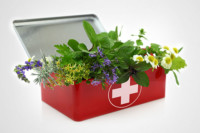The word ‘herb’ means different things to different people. To some, it means a spice that they cook with. For others, it’s another name for annoying weeds that they have to mow once a week. And yet, for a select few, herbs are multifaceted plants that serve as food, medicine, and for some, even a spiritual item.
Every plant has some sort of quality to it, be it medicinal, edible, or to assist the ecosystem in some way or another. After all, a weed is merely a misunderstood herb, waiting on someone to figure it out. The goal of many herbalists, even dating back centuries before, has been to discover each plant’s purpose and use.
The problem with this way of thinking is that sometimes we forget to just sit back and enjoy. While every plant serves some sort of function, we fail to also notice and admire their beauty. This is where the spiritual side of working with herbs comes into play. Historically, herbs have often been viewed as having mystical powers. And without the wonder and mystery surrounding the unknown and labeling it as magic, we would never have studied many of these herbs long enough and in depth enough to have discovered the science and purpose of these often powerful plants.
Through this wonder and speculation, we typically enter into the realm of edible plants. Our ancient ancestors, relying on their senses alone for scientific analysis, would have nibbled, and sniffed, and touched the plants, trying to assimilate as much information as they could about them in order to ascertain their uses. Some herbalists, in order to learn more about a plant, will cook with it to learn about the plant’s properties once it has been cooked. This is also how many an herbalist, following similar methods as our ancient ancestors, learns to develop a keen sense of taste and smell. Cooking with spices and exploring the world of edible plants is how many budding herbalists get their feet into the water, before they completely dive in.
However, before diving into the edible, many people enter into the world of medicinal. This can often happen when they hear or read about how that stubborn weed that they’ve been trying to eradicate in their backyard is actually a highly medicinal liver tonic. This leads to people wondering just what other backyard medicinals they have been intentionally destroying in the interest of a manicured lawn. If this little idea sets a spark inside of someone, they tend to become what I like to call “Herb Nerds” and go a little crazy with the research aspect of herbalism. This is an important and necessary step in setting the foundation for truly understanding and appreciating herbs not just in the medicinal realm, but also the culinary realm.
So, what are herbs? Herbs are spiritual, medicinal, and edible. They remind us try to stay grounded, but to also remember to nourish and heal wherever we go. Herbs are something ancient and something new. They are for the sceptic and the believer. Herbs are not meant just for us, but for everything.
I like to think of herbs as being an example of how we should treat ourselves. Each herb is multifaceted, just like we are. If one of our many systems is neglected, the whole begins to fall apart. It’s the same with an herb. You can ignore the spiritual side of herbs, but in doing so, you ignore their history and culture and you ignore the fact that they create wonder and inspiration, You can ignore the medicinal side, but in doing so, you may be preventing yourself from living your life to the fullest. And you can ignore the edible side of herbs, but in so doing, you might be missing out on the most delicious meal you’ve ever had.
Herbs are many things, but ultimately, they are their own entities and will do what they like. Just like the pesky dandelion that always finds that one crack in the sidewalk, an herb is going to be what it is meant to be. There is much for us to learn from herbs, and all it takes is for that little spark of interest, be it spiritual, medicinal, or edible, to open us to the many facets of these wondrous plants.





Leave A Comment